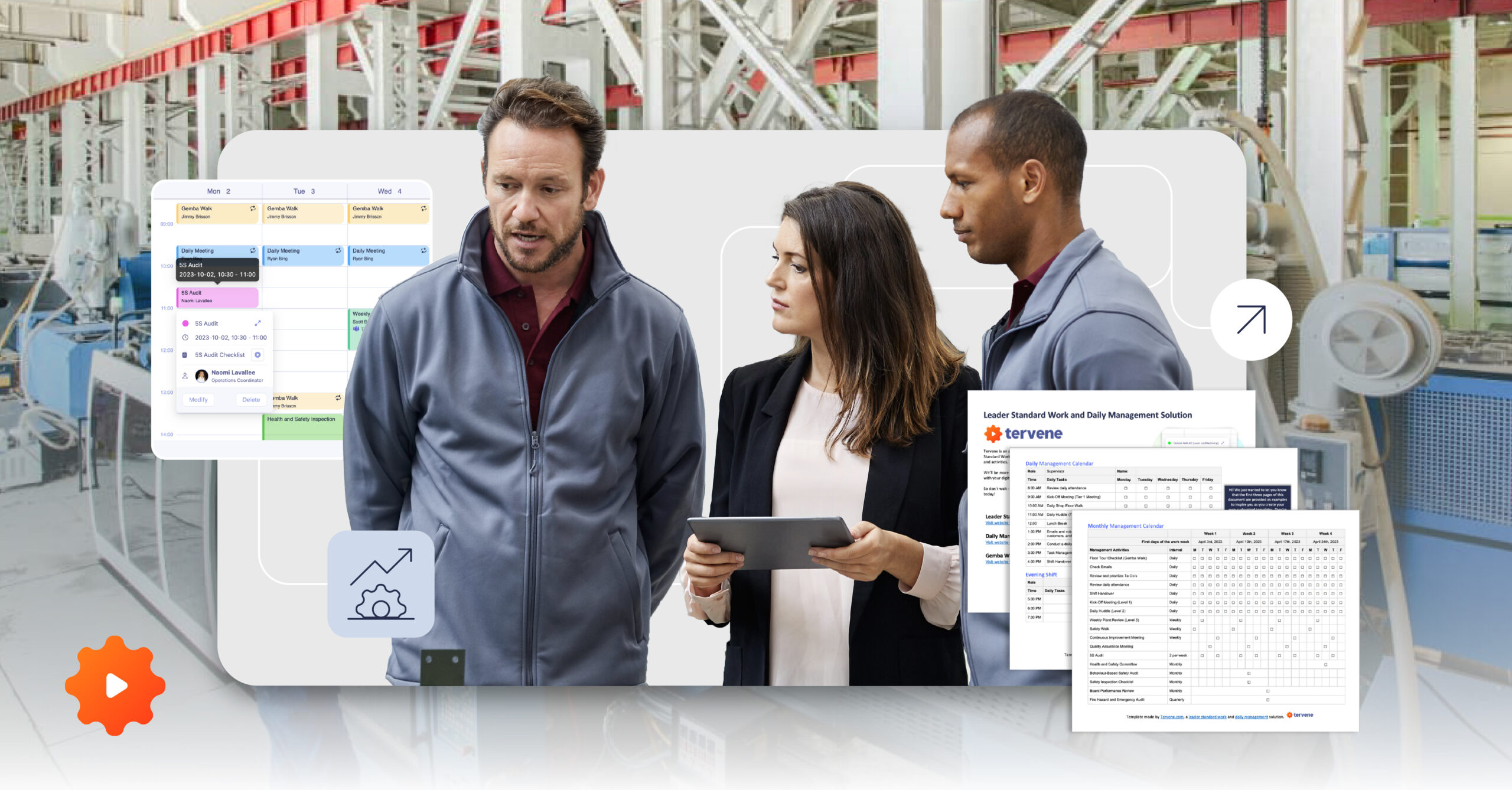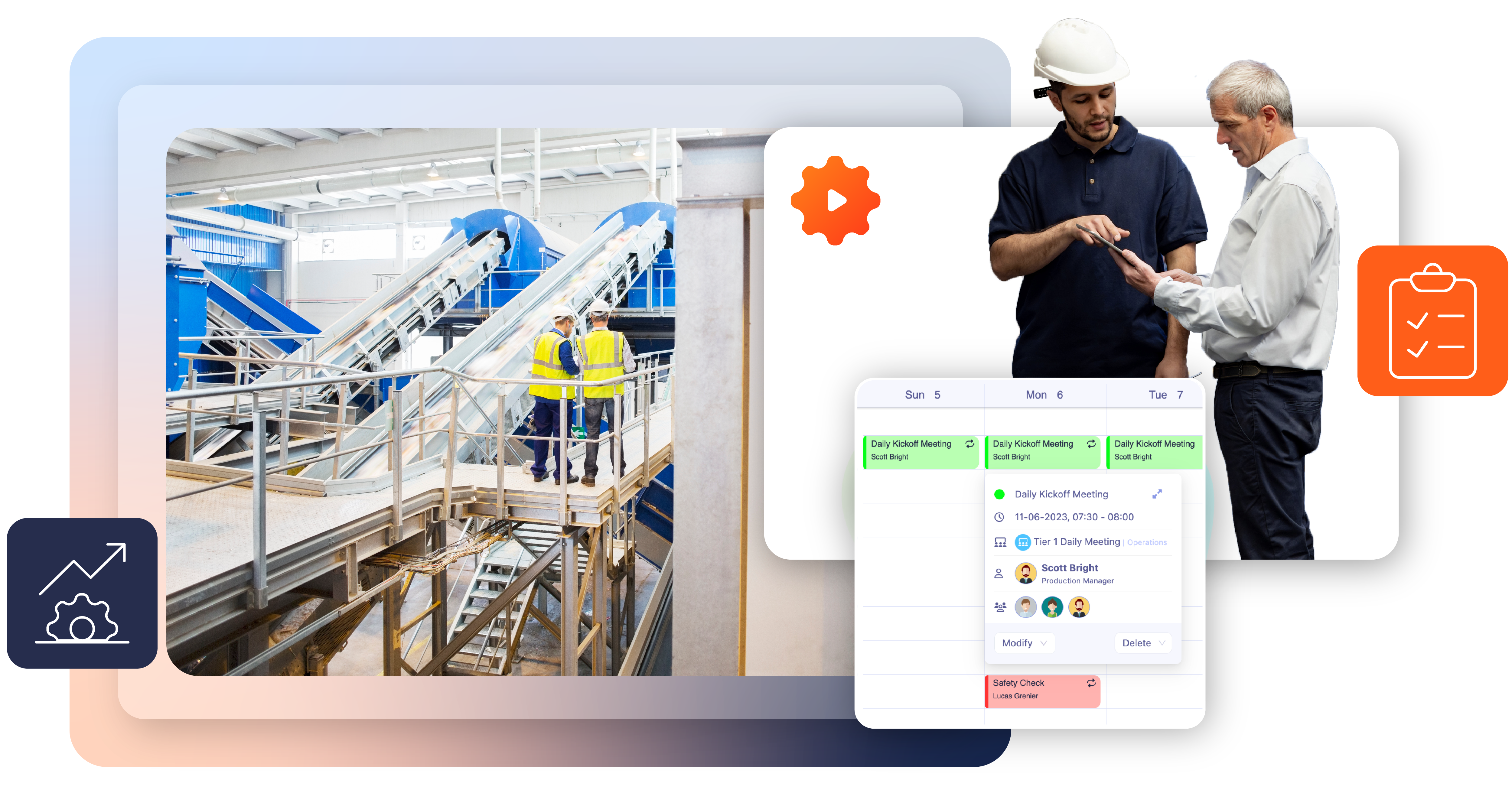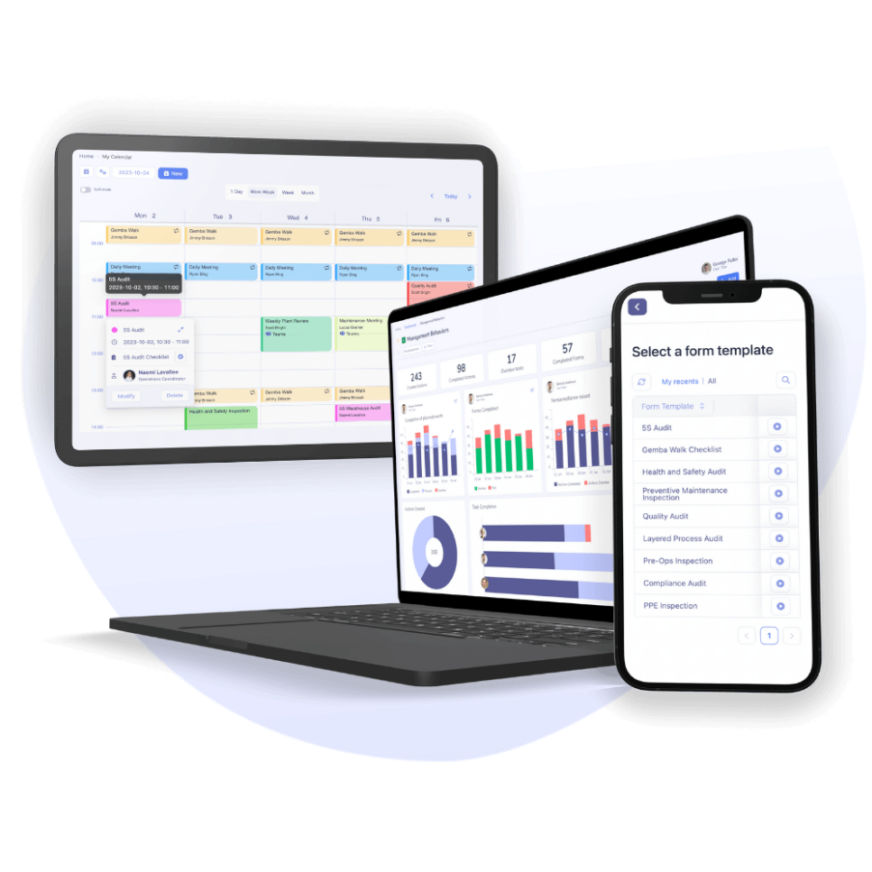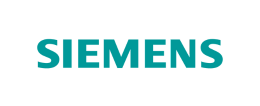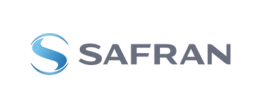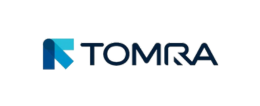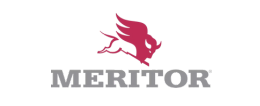Coaching and Empowering Frontline Managers to Improve Management Performance

| Audience: | Manufacturing Managers, Healthcare Administrators, Operational Excellence and Lean Management Practitioners, HR Coordinators, Organizational Leaders |
| Last updated: | September 18, 2025 |
| Read time: | 7 minutes |
- Define and standardize supervision: Clarify roles, set routines with Leader Standard Work, and use indicators, audits, and visual management to keep practices consistent.
- Coach and support supervisors: Provide 1-on-1 meetings, field coaching, onboarding, and training (internal or external) to strengthen accountability and leadership skills.
- Foster collaboration and efficiency: Break silos with support groups, simplify admin tasks, document critical know-how, and share best practices across sites and teams.
Frontline managers play a crucial role in supporting daily operations. They coordinate shifts and work teams, ensure production planning, prioritise problem-solving and follow action plans with the support groups. Manufacturers that sustain excellent supervision practices get better control over daily operations. Thus, they improve synergy between operators, support groups and top management.
Although some supervisors acquire good managerial skills through experience, most supervisors and team leaders keep a reactive approach when handling issues and gaps. When the reactive approach is used, the priority is to solve any current issue as fast as possible. In such situations, supervisors can feel overwhelmed and thus have a hard time prioritising actions if they lack management standards.
Challenges related to supervision and the lack of standards
- Management performance heavily relies on the experience of employees
- There is a high turnover rate of operators and supervisors
- The use of the firefighter mode to handle issues as fast as possible
- The difficulty in prioritising corrective actions and giving feedback
- Unplanned communication between supervisors and support groups
- Heavy administrative workload when transcribing information
Worldwide manufacturers empower supervisors and support groups with better tools.
Equipping frontline managers and fostering best management practices can unlock a better control of daily operations. It reduces reactive management, siloed teams and the lack of visibility on performance.
Download Tervene’s Overview – PDF Brochure
14 Ways to Coach Team Leaders and Supervisors to Enhance Management Skills
1. Communicate roles and responsibilities for supervisors
Supervisors have their own specific roles and responsibilities for operations control and excellence. To foster frontline managers’ accountability and ownership, organizations should define and share expectations. The goal is to close the gap between the expectations from supervisors and what they handle on a day-to-day basis.
2. Set up recurrent 1-on-1 meetings
Managers perform 1-on-1 meetings with their subordinates: top management with middle management, middle management with supervisors and supervisors with team leaders. These weekly or monthly recurring meetings nurture the working relationship and create a discussion time for informal and formal topics.
3. Standardize your management practices with collective tools
For some manufacturers, the management performance relies on the frontline team’s experience. Without proper processes and standard practices, managers have difficulty to maintain a proactive control and sustain an improvement culture. On the opposite, standardized management and technology supports consistency between managers, shifts, departments. For example, manufacturers can standardize production meetings, improvement meetings, shift handovers and inspection forms with digital tools.
4. Embrace the leader standard work (LSW) fundamentals
Daily routines help to standardize tasks and incorporate essential management practices into supervisors’ daily or weekly workload. Managers should plan the recurring activities: daily meetings, weekly follow up, inspections, gemba walks, improvement meetings, coaching and more. Essentially, it is easier to perform proactive management practices and foster a daily routine with standard leader work methods.
5. Monitor your teams’ adherence to management practices with indicators
It may be difficult to coach supervisors without indicators and data on management behaviour. Digitally performed management systems provide insights on management activities in order to identify coaching needs. How many improvement opportunities should they come up with weekly? How long should their meetings last? What indicators should they monitor and how often should they use daily checks? Top managers should communicate these objectives to the supervisor beforehand.
6. Coach and support supervisors on the field
The immediate manager of a supervisor can occasionally conduct management practices with his subordinate. Doing so helps the manager pinpoint how to coach the supervisor better. For example, a manager will observe how his supervisor performs an audit or a floor tour (Gemba walk). The manager can suggest improvements on the spot or transfer points to a formal 1-on-1 meeting. The supervisor should be advised of such practice beforehand in order to strengthen the supervisor-manager relationship.
A common practice is to onboard team leaders and supervisors by promoting experienced technical operators to new roles. With proper coaching and support, they quickly adopt management abilities. The leader’s standard work improves their ownership and accountability. Onboarding is an excellent place to start standard management practices.
7. Audit the supervisors’ management practices
Top managers can perform audits on the supervisors’ management practices in order to pinpoint improvement opportunities and promote the adherence to best practices. Supervisors and team leaders should know the criteria of the inspection. For example, a top manager can use a validation form and audit supervisors’ meeting practices.
“Auditing management practices is a great way to ensure standardization and stronger management. It helps challenge and improve the methods used in collaboration with frontline managers while giving a clearer portrait of the management maturity. It also helps managers adhere to standard methods and avoids them to manage based on their habits.”
- Julien Hébert, Jr. Ing., Project Manager and trainer at Tervene
8. Provide management training and support by consultants firm
Sometimes, top-management and leadership teams have difficulty finding time to coach supervisors or even to promote experienced workers to team leader roles. Several organizations rely on external expert firms such as Tervene, Linovati, BP&M and Toptech France, in order to have a look at the supervisors’ challenges, improve training and foster autonomy. Among the training programs offered, we can count: proactive supervision, problem-solving practices, operational excellence strategies, continuous improvement, 5S deployment and lean management concepts
9. Leverage visual management usage
Visual management helps supervisors track indicators, lead meetings and discuss with their teams about performance gaps and action plans. What matters is to deploy visual management according to operational excellence objectives.
- Leader Standard Work sheet
- Visual QRQC resolution method (Quick Response Quality Control)
- SQCDP board (Safety – Quality – Cost – Delivery – People)
- A3 Resolution reporting
- KPIs and production boards
- …
10. Ensure a systematic presence of supervisors
Even if supervision duties imply administrative tasks and emergency problem-solving, frontline managers should be able to actively support their team on the field. Digitally performed Gemba Walks help standardize supervisors’ presence to proactively control the next shift or workday with observations and employee engagement. Moreover, employees can raise issues and gaps easily while getting feedback from the supervisor.
11. Break silos
It is essential to break silos between support groups and supervision in order to accelerate problem-solving. Most manufacturers go digital to connect the workforce. They empower frontline managers to support operation members. Structured communication levels and cross-team communication enable teams to address issues quickly, gaps and noncompliances: deadlines – safety – maintenance – quality – HR, …
12. Streamline frontline managers’ administrative tasks
Paper-based management rarely promotes the best supervision practices. With digital platforms, administrative tasks are easier and quicker to perform. With digital platforms, administrative tasks are easier and quicker to perform and reduce the need for transcription of notes. Also, the use of such tools helps managers free up time to support their teams, control the operations proactively and manage improvement projects.
13. Document your most experienced employees’ knowledge
The operational know-how are some of the most valuable assets. Organizations need to put forward methods to transfer this knowledge inside their institution, otherwise there is a high risk of losing management control and operational expertise when employees who have the specific knowledge leave. A manager can continuously create and update content in a digital format to promote his team’s autonomy. Supervisors recently promoted for their technical experience can also document their knowledge in order to share with workers and focus on their new role.
14. Share best practices between departments, sites and organizations
Some supervisors’ management abilities stand out from others. In the same way, a department or an entire business unit might have a performance gap. Sharing best practices elevates everyone’s management skills and highlights improvement opportunities based on different experiences. For this reason, manufacturers participate in workshops and external or internal operational excellence networks.
Empowered Teams Sustain Better Management Practices
Empowering supervisors with connected management tools improves efficiency and standard leader work. Several organizations choose to equip frontline managers with better tools to simplify problem-solving and accelerate decision-making with support groups. Finally, digitization increases visibility and traceability on operational issues, noncompliances, corrective actions and management behaviours.
About Tervene, The Frontline Digital Platform
Tervene supports organizations’ daily operations control. Our connected platform empowers frontline teams and top management to reach operational excellence with stronger daily management, collaboration and problem-solving processes.
